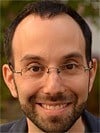What is a complete human lifetime, and what does it mean to live a full life? Parshat Chayei Sarah takes on these deeply difficult questions by beginning and ending with death—two deaths that are as unequal as they are momentous in the history of the Jewish people.
The parshah begins: “Sarah’s lifetime—the span of Sarah’s life—came to one hundred and twenty-seven years.”[1] A midrash relates that upon hearing that Abraham had nearly slaughtered her son with a knife upon an altar to God, Sarah died suddenly and prematurely, “me’oto tza’ar —from that very pain.”[2] The suffering of her son actually destroyed her own well-being.
In contrast, at the end of the parshah, Abraham dies a peaceful, natural death: “This was the total span of Abraham’s life: one hundred and seventy-five years. And Abraham breathed his last, dying at a good ripe age, old and contented; and he was gathered to his kin.”[3] Whereas Sarah dies in response to her son’s near sacrifice, Abraham lives long enough to witness his twin grandsons’ fifteenth birthdays.[4]
Today, a person’s life expectancy can vary wildly, depending on where she was born. Japan and Hong Kong top the list at an average of 82.7 and 82.2 years, while Afghanistan and Zimbabwe bottom out at 43.6 and 43.4.[5] People consistently die younger in sub-Saharan Africa, the Indian subcontinent and other parts of the Global South. This fact in itself is devastating. The unfulfilled potential of these lives—economic, social and cultural—cannot be measured.
The unnaturally low life expectancy in developing nations also violates the “right to life” included in the UN Declaration of Human Rights.[6] “Right to life” is an extraordinary expression, implying the right to one’s entire potential life, to die of natural causes in contented old age; in a manner of speaking, to avoid tza’ar—the kind of trauma that brought about Sarah’s early death. To realize this right requires us to address the whole range of human needs, from health care and clean water to economic opportunity and an end to armed conflicts.
Yet the meaning of a fulfilled, fulfilling life is not captured merely by longevity and the absence of suffering. It must also include emotional satisfaction, the living out of one’s values and the development of the spirit. Abraham’s contentedness is defined not merely by his wealth or years, but also by his ability to see his grandchildren and to rest in the embrace of his kin.
Social change movements in the United States have long recognized this truth, expressed so beautifully in comments attributed to Rose Schneiderman, a Jewish immigrant worker and labor leader of the early 20th century:
What the woman who labors wants is the right to live, not simply exist—the right to life as the rich woman has the right to life, and the sun and music and art. You have nothing that the humblest worker has not a right to have also. The worker must have bread, but she must have roses, too.[7]
Schneiderman makes the point that life is not all about physical or material well-being. It requires happiness, sensuality and culture. Moreover, this fulfilled life is not simply to be wished for. It must be won in the context of a struggle for justice, by insisting on equal access to it for both the rich and the poor.
This same truth is recognized by contemporary grassroots organizations in the Global South, such as the Rural Organization for Social Education (ROSE), an AJWS grantee in India. ROSE strives to build:
…a better informed rural community that is able to challenge the status quo about its socio-economic standing and successfully change the age-old, unjust practices against it. [ROSE] makes extensive use of folk art forms such as street plays to inspire such critical thinking in the community.[8]
ROSE seeks not only economic but also social well-being, and it uses not only political but also cultural tools to get there. This integration of methods and goals exemplifies the approach to development taken by AJWS and its grantees. Development should not only increase the supply of food, medicine or classrooms. It must also bring about long-term change that enables the emotional and cultural fulfillment that all people deserve.
Abraham was fortunate to die “old and contented,” but what does this phrase mean? The 13th-century commentator Ramban explains: “He saw all the longings of his heart come to pass.”[9] Ramban’s description of Abraham helps us understand that our personal aspirations are no less vital to our lives than our physical well-being. As we support development in the Global South, we should listen to local community organizations as they articulate the full range of what it means, to them, to realize their right to life.
[1] Genesis 23:1.
[2] Genesis Rabbah 58:5.
[3] Genesis 25:7-8.
[4] Sarna, Nahum M. The JPS Torah Commentary: Genesis. Philadelphia: Jewish Publication Society, 1989, p. 124. See also Psalm 128: “So shall the man be blessed who is in awe of God … ureih vanim l’vanechah—you will see the children of your children—[and] peace upon Israel.”
[5] “Human Development Report 2009.” United Nations Development Programme. http://hdrstats.undp.org/en/indicators/88.html
[6] “Universal Declaration of Human Rights, Article 3.” United Nations. http://www.un.org/en/documents/udhr/index.shtml
[7] Cited in Eisenstein, Sarah. Give Us Bread But Give Us Roses: Working Women’s Consciousness in the United States, 1890 to the First World War. London: Routledge, 1983, p. 32.
[8] “Rural Organization for Social Education.” 26 Oct. 2009. http://www.rosetrust.in/empowerment.html. ROSE is also featured as part of AJWS’s campaign, Fighting Hunger from the Ground Up; see http://ajws.org/hunger/grantees/rose
[9] Ramban on Genesis 25:8.

